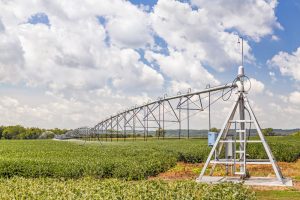
U.S. Sen. Joni Ernst (R-IA) on Tuesday introduced a bipartisan bill to help farmers and conservation groups forge partnerships to improve the environment by strengthening the Regional Conservation Partnership Program (RCPP).
The Regional Conservation Partnership Program Improvement Act, which Ernst introduced with U.S. Sen. Debbie Stabenow (D-MI), would enhance the RCPP that was established under the 2014 Farm Bill to improve water quality, restore Great Lakes watersheds and promote sustainable use of natural resources.
Since it was established in 2014, the RCPP has generated $1.2 billion in private funding and has created partnerships involving more than 2,000 agricultural and conservation stakeholders. The measure introduced on Tuesday would expand the reach of conservation projects, rollback current program restrictions and regulations, and offer more flexibility to attract new partners.
“Our farmers and producers have an innate understanding of how to best care for the land they rely on to feed and fuel our world,” Ernst, a member of the Senate Agriculture, Nutrition and Forestry Committee, said. “As we have seen in Iowa, the RCPP is a successful and cost-effective approach to encourage voluntary and proactive conservation. Such success makes it critically important to further develop the RCPP in order to continue incentivizing rural and urban partnerships, and allow greater flexibility in their efforts to improve water quality and soil health.”
The bill would narrow RCPP’s focus on improving water quality, drought resilience and wildlife habitats. It would also create new incentives through a pilot grant program to encourage more diverse partnerships and innovative approaches to conservation.
Mark Recker, the president of the Iowa Corn Growers Association (ICGA) and a farmer from Arlington, Iowa, said his organization has partnered on multiple RCPP projects, and all those experiences have been positive.
“ICGA’s priority for conservation in the next farm bill is simpler programs that help farmers address challenges on working lands and better incorporate the farmer perspective,” Recker said. “We believe this legislation adds additional flexibility for farmers and partners to do more innovative work in the areas of conservation and water quality.”
Bill Shipley, the president of the Iowa Soybean Association, said Ernst’s bill is an important step forward in expanding and streamlining U.S. Department of Agriculture support of conservation partnerships.
“Our farmers have had good success working in partnership with cities, state agencies, conservation groups and others using the RCPP to achieve progress on our Iowa Nutrient Reduction Strategy,” Shipley said. “The proposed changes will result in more funding, less red tape for farmers and partners and support of watershed approach all resulting in more bang for the buck, which we strongly support.”



